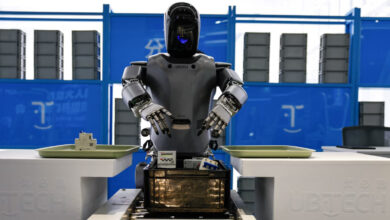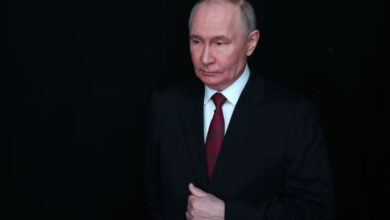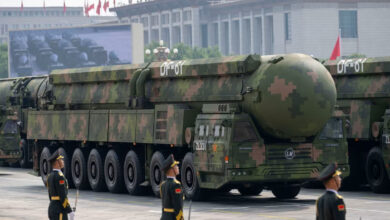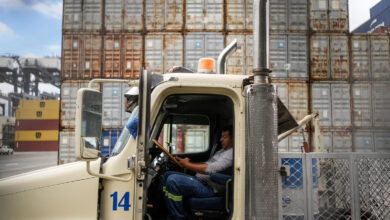Russian President Vladimir Putin arrived in China on Tuesday for a three-day visit aimed at bolstering a crucial alliance that has seen the giant neighbors block further action against Syria.
Both energy and foreign policy cooperation are high on the agenda, with Putin also participating in a regional summit Wednesday and Thursday where he will separately meet the presidents of Iran and Afghanistan.
Putin's China trip, his first to Asia since starting an historic third term last month, comes after failed attempts by EU leaders to sway him on Syria — a Soviet-era ally Moscow still supplies with arms.
Beijing and Moscow have walked in lockstep on Syria to growing anger from Arab and Western nations, with EU President Herman Van Rompuy telling Putin in Russia on Monday that world powers needed to "find common messages on which we agree."
Known for confronting the West repeatedly during his 2000–2008 presidency, Putin pointedly skirted the issue of Syria during Monday's briefing with EU leaders, noting only that "our positions do not coincide on every issue."
Putin has been keen to play up the importance of Russia's at-times uneasy ties with China, which have grown stronger in the past year as both used their veto power on the UN Security Council to block action against Damascus.
Although the two nations had periodic border conflicts and viewed each other with suspicion in Soviet times, Foreign Minister Sergei Lavrov declared this weekend that Russia had an exemplary partnership with China on foreign policy.
"All in all, we consider the cooperation on foreign policy on all levels between Russia and China a successful model of coordination between partners," Lavrov said in comments posted on the Russian foreign ministry's website.
Beijing's state-run China Daily newspaper also played up the relationship between the two countries in an editorial on Tuesday, saying it was in "good shape" and "bodes well for the future."
"At a time when East Asia and North Africa have undergone profound changes, Beijing and Moscow have been standing firmly together to safeguard the tenets of the UN charter and the norms of international relations," it said.
Putin, who is flying to China just weeks after canceling a visit to the United States, was due to hold extensive talks with President Hu Jintao later Tuesday.
He will also be welcomed with a formal reception at Beijing's colossal Great Hall of the People in the evening.
With China preparing for a stage-managed leadership change, Putin will on Wednesday meet Vice Premier Li Keqiang, who is set to be the next premier, and Xi Jinping, who is tipped as the next president.
Kremlin's foreign policy aide Yury Ushakov said last week the two countries planned to sign 17 diplomatic and business agreements that should help support booming trade, which reached US$80 billion (64 billion euros) last year.
The Russian delegation includes six cabinet members, the heads of Russia's energy giants Gazprom, Rosneft and Transneft, and "all the major names of Russian business," Ushakov said.
While energy is high on the agenda, a long-awaited gas deal that could see Russia supply 70 billion cubic meters of gas a year directly to its neighbor will not be signed due to pricing disagreements, Gazprom said on Monday.
Among reported deals to be inked during the visit is a joint project to develop a new long-haul aircraft by Russia's Ilyushin and China's Comac.
Putin is a frequent guest of Chinese leaders, last visiting Beijing in October in his then capacity as prime minister. It was his only foreign trip after he announced in September his plan to run for president.
A month after his trip, he was awarded a Chinese version of the Nobel prize for "keeping world peace."
The Russian president arrives in Beijing from Tashkent, where he met his Uzbek counterpart Islam Karimov for talks focused on security issues linked with NATO's planned withdrawal from neighboring Afghanistan.




